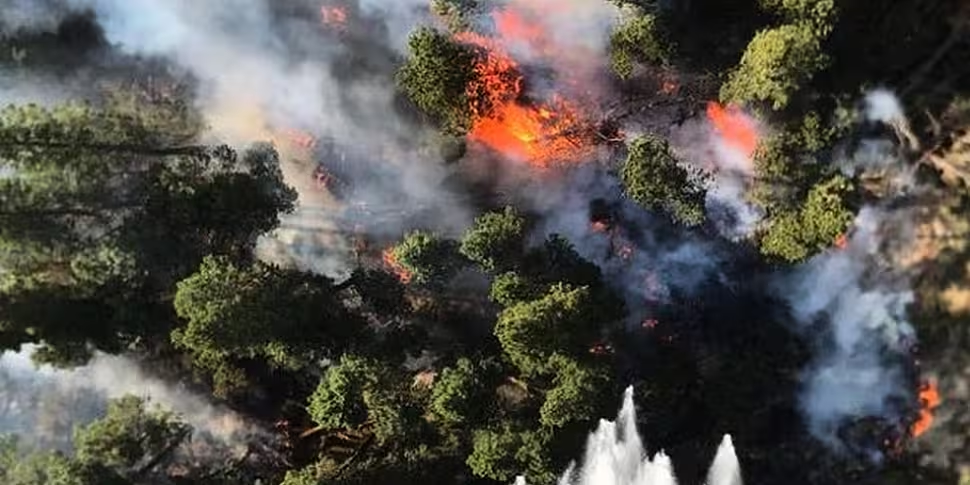The Defence Forces have deployed extra personnel to assist with fire-fighting efforts in Galway.
Some 49 personnel from An Chead Cathlan Cois have been tasked to help with operations in Oughterard.
Members of the army were operating in an aid to civil authority capacity, which has seen them help with the suppression of secondary fires.
The Air Corps has also deployed two aircraft - the EC135 and AW139 helicopter - over the last two days.
The Defence Forces say: "The EC135 provided a command and control element during Defence Forces operation's while the AW 139 helicopter, fitted with a specialist under slung Bambi Bucket, dropped water on affected areas."
The Air Corps dropped 158,500 litres of water in the past 48 hours.
It says this is in addition to 42,000 litres dropped during fire-fighting operations in the Ox Mountains on May 6th.
1,500 hectares of forestry
A regional emergency response operation remains in place as the huge forest fire continues to burn.
Coillte has warned that it could be days before the fires are put out - with heavy rains potentially the only thing that will completely extinguish the flames.
It is believed that over one-third of the forestry in the Cloosh Valley - Ireland's largest forest - has now been destroyed by the fire.
In a statement earlier, Coillte warned that over 1,500 hectares of forestry and 2,000 hectares of bog land has been taken by the blaze – described as a once in a generation event.
Coillte staff and fire services have been at the scene since 5:30am and civilian and Air Corps helicopters have been carrying out water drops since the early hours.
The blaze has threatened the welfare of many homes and local communities – and caused devastation to vast areas of wildlife habitat.
We have 2 helicopters working in Galway with local crews and @defenceforces personnel to battle fires @rtenews @IrishTimes @Independent_ie pic.twitter.com/UtSezOgnUF
— Irish Air Corps (@IrishAirCorps) May 10, 2017
The Minister for Regional, Rural and Gaeltacht Affairs Heather Humphreys condemned anyone responsible for setting gorse fires around the country.
"It is absolutely awful when you see the devastation it causes," she said. "You just have to look at the woman whose house was burned - that was absolutely awful - you have to look at the destruction of the habitat, the destruction of wildlife."
Greater support
Farmers in the area have claimed that Coillte prioritised protecting wind turbines when they could have provided more help protecting local lands.
Local farmer Kevin McDonagh said the community had to try and put out the blaze without sufficient resources:
Coillte has denied the claim - with the agency's managing director of forestry, Gerard Murphy insisting that it has done everything it could to protect the local community.
“When you have a fire that is out here at the moment, first of all your first priority is to life – so actually the people who are out here fighting the fires, our first priority is to protect them,” he said.
“Our second priority is to protect livestock, property and then assets.
“The fire is so extensive here and we are stretched and have been stretched – remember we are not just fighting a fire here, we have had them all over the country.”
Warning to the public
Members of the public have been warned to stay away from any areas affected by these fires and to immediately report any uncontrolled or unattended fires to the Fire and Emergency Services.
A spokesperson for Coillte has praised the work of the defence forces and emergency services, “whose lives are put at significant risk in combating these forest fires.”
Our crews are continuing to support local fire services to battle the forest fires in Galway. @defenceforces pic.twitter.com/XvnomiKEzN
— Irish Air Corps (@IrishAirCorps) May 9, 2017
While the cause of the Cloosh valley blaze has yet to be established – Coillte believes it may have originated from deliberate set gorse fires which subsequently spread.
As of yesterday evening, there were an estimated that 20 - 30 fires ongoing across the country.
Last week emergency services in Northern Ireland warned that almost 250 fires had been reported across the region since the beginning of May – adding that they believe the majority were started deliberately.
Under Ireland’s Wildlife Act anyone caught deliberately setting fire to growing vegetations between March and August is liable for prosecution.
Additional reporting: Jack Quann









